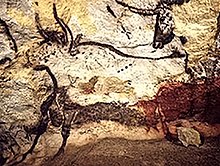Historia mundi



Historia mundidescribithistoriam hominumsecundum materiasarchaeologicasetscriptasinvestigatas.Historiaantiqua nota coepit cumscriptura inveniretur.[1][2]Fundamenta autemcivilizationisad primamtechnologiamintroductam etculturamexcogitatam retro extenduntur.PraehistoriaAevoPalaeolithico( "Primo Aevo Lapidis" ) incipit, quodAevum Neolithicum( "Novum Aevum Lapidis" ), etRevolutio Neolithica(inter 8000 et 5000 a.C.n.) inLuna fertilisecuta sunt. Illud aevum mutationem maximi momenti in historia hominum vidit, cum homines ordinatamplantarumetanimaliumtutelam inciperent.[3][4][5]Agriculturaprogrediebatur, et plurimihominesvitamnomadicamreliquerunt etagricolaeincoloniis perennibusfacti sunt. Nomadismus in nonnullis locis continuabat, praecipue inregionibussecretis ubi erant paucaespeciesplantarum quae domari poterant.[6]
Ubi progrediebatur, agriculturadivisionem laborumincitavit ut cibus inter vera reservaretur. Inde divisio laborum ortum classis otiosae institutionemque urbium effecit.
Res historicae[recensere|fontem recensere]
- Historia oeconomica mundi
- Cultus humanus
- Evolutio hominis
- Potestas ignis
- Potestates historicae
- Demographia mediaevalis
- Historia agriculturae
- Historia scientiae
- Historia technologiae
- Historiographia
- Inundatio (mythologia)
Historia per regionem[recensere|fontem recensere]
- Historia Africae
- Historia Asiae
- Historia Europae
- Historia Orientis Medii
- Historia Oceaniae
- Historia Americarum
- Historia Antarcticae
Notae[recensere|fontem recensere]
- ↑Secundum David Diringer ( "Writing",Encyclopedia Americana,(1986), 29:558: "Writing gives permanence to men's knowledge and enables them to communicate over great distances.... The complex society of a higher civilization would be impossible without the art of writing."
- ↑H. Webster, (1921),World history.Bostoniae: D.C. Heath.p. 27.
- ↑Colin Tudge,Neanderthals, Bandits and Farmers: How Agriculture Really Began(Londinii: Weidenfeld & Nicolson, 1998,ISBN 0-297-84258-7).
- ↑Peter Bellwood,First Farmers: The Origins of Agricultural Societies(Blackwell Publishers, 2004,ISBN 0-631-20566-7).
- ↑Mark Nathan Cohen,The Food Crisis in Prehistory: Overpopulation and the Origins of Agriculture(Portu Novo et Londinii: Yale University Press, 1977,ISBN 0-300-02016-3).
- ↑Vide Jared Diamond,Guns, Germs and Steel.
Bibliographia[recensere|fontem recensere]
- Ankerl, Guy.Coexisting Contemporary Civilizations: Arabo-Muslim, Bharati, Chinese, and Western,Geneva, INUPRESS, 2000,ISBN 2-88155-004-5.
- The Biosphere(AScientific AmericanBook), San Francisco, W.H. Freeman and Co., 1970,ISBN 0-7167-0945-7.
- Blainey, Geoffery.2000.A Short History of the World.Penguin Books, Victoria.ISBN 0-670-88036-1.
- Braudel, Fernand.1974.Capitalism and Material Life, 1400–1800.Novi Eboraci: HarperCollins.ISBN 0-06-010454-6.
- Braudel, Fernand.1996.The Mediterranean and the Mediterranean World in the Age of Philip II.Berkeleiae: University of California Press.ISBN 0-520-20308-9.
- Diamond, Jared.1996.Guns, Germs, and Steel: The Fates of Human Societies.Novi Eboraci: W. W. Norton.ISBN 0-393-03891-2.
- Ebrey, Walthall, et Palais.2006.East Asia: A Cultural, Social, and Political History.Bostoniae: Houghton Mifflin Company.ISBN 0-618-13384-4.
- Energy and Power.1971.AScientific AmericanBook. Franciscopoli: W. H. Freeman and Co.ISBN 0-7167-0938-4.
- Fukuyama, Francis.1992.The End of History and the Last Man.Free Press.ISBN 0-02-910975-2.
- Gombrich, Ernst H.2005.A Little History of the World.Yale University Press.
- Hodgson, Marshall.1933.Rethinking World History: Essays on Europe, Islam, and World History.Cantabrigiae.
- Nordhaus, William D.2015.A New Solution: The Climate Club. Recognitio Gernot Wagner et Martin L. Weitzman,Climate Shock: The Economic Consequences of a Hotter Planet(Princeton University Press),The New York Review of Books62(10):36–39, 4 Iunii.
- Kennedy, Paul.The Rise and Fall of the Great Powers: Economic Change and Military Conflict from 1500 to 2000,Novi EboraciL:Random House, 1987,ISBN 0-394-54674-1.
- Parker, G.1997The Times Atlas of World History.Londinii: Times Books.
- Pomeranz, Kenneth.2000.The Great Divergence: China, Europe and the Making of the Modern World Economy.Princetoniae.
- Ponting, Clive.2000.World History: a New Perspective.Londinii.
- Reezs, Martin. interviewed by Erin Biba, "An Apocalypse Think Tank",Scientific American.
- Spodek, Howard.2001.The World's History: combined volume.Upper Saddle River, NJ, Prentice Hall.
- Trompf, G. W.1979.The Idea of Historical Recurrence in Western Thought, from Antiquity to the Reformation.Berkeleiae: University of California Press.ISBN 0-520-03479-1.
- Wells, H. G.1920.The Outline of History.Volume One.Novi Eboraci: MacMillan.
- Weech, W. N., ed.1944.History of the World.Londinii: Odhams, Long Acre.
- Williams, H. S.1904.The historians' history of the world; a comprehensive narrative of the rise and development of nations as recorded by over two thousand of the great writers of all ages.Novi Eboraci: The Outlook Company.
- Wright, Ronald.2004.A Short History of Progress.Toronti: AnansiISBN 0-88784-706-4.
Bibliographia addita[recensere|fontem recensere]
- Fournet, Louis-Henri.1986.Diagrammatic Chart of World History.Editions Sides.ISBN 978-2-86861-096-6.
- Gonick, Larry.1997.The Cartoon History of the Universe.Vol. 1, Main Street Books, 1997,ISBN 978-0-385-26520-1,Vol. 2, Main Street Books, 1994,ISBN 978-0-385-42093-8,Volume Three, W. W. Norton & Company, 2002,ISBN 978-0-393-32403-7.
- Landes, David.1999.The Wealth and Poverty of Nations: Why Some Are So Rich and Some So Poor.Novi Eboraci: W. W. Norton & Company.ISBN 978-0-393-31888-3.
- Landes, David.2006."Why Europe and the West? Why Not China?"Journal of Economic Perspectives20:2.
- McNeill, William H.1963.The Rise of the West: A History of the Human Community.Sicagi: University of Chicago Press.
Nexus externi[recensere|fontem recensere]
- "Crash Course World History,"youtube
- Gobekli Tepe,science.nationalgeographic
- Museum Britannicum.A History of the World,britishmuseum.org
- Pella, John, et Erik Ringmar.History of International Relations Open Textbook Project,wayback.archive.org.
